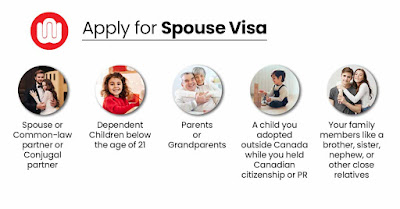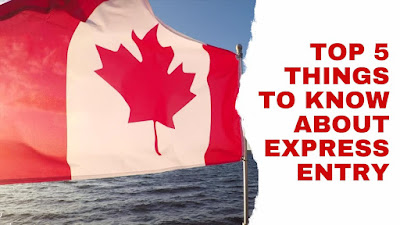What is a Dependent visa Canada?
A dependent visa in Canada is a type of visa that allows certain family members of Canadian citizens or permanent residents to join them in Canada. It's also known as a "family sponsorship visa" or "family class visa."
The primary purpose of Dependent Visa Canada is to reunite families and allow close relatives to live together in Canada.
Who can apply for a dependent visa in Canada?
Spouse or Common-Law Partner
Canadian citizens and permanent residents can sponsor their legally married spouses or common-law partners for dependent visa Canada.
Conjugal Partner
Those in a genuine conjugal relationship with a Canadian citizen or permanent resident but unable to marry or live together in their home country may also be eligible for sponsorship.
Dependent Children
Children who are under a certain age (the age limit may vary depending on the specific sponsorship category) and financially dependent on the sponsor.
Parents and Grandparents
Canadian citizens and permanent residents can sponsor their parents and grandparents to live in Canada.
What are the eligibility requirements for a Canada-dependent visa?
Sponsorship Eligibility
You must be a Canadian citizen or a permanent resident of Canada to be eligible to sponsor a family member for eligibility for PR in Canada through this pathway.
Age and Relationship Eligibility
The family members you wish to sponsor must meet specific age and relationship criteria. Common categories include spouses, common-law partners, dependent children, and, in some cases, parents and grandparents.
Financial Eligibility
Sponsors are required to demonstrate they have the financial means to support the sponsored family member(s) and meet a minimum necessary income. This income requirement can change, so it's important to check the current figures on the official Government of Canada website.
No Receiving Social Assistance:
Sponsors must not be receiving social assistance (welfare) from the Canadian government except for disability or old-age pensions for eligibility for PR in Canada through dependent visa.
No Criminal Record:
Sponsors must not have a criminal record or be in prison for eligibility through the dependent visa Canada.
No Immigration or Sponsorship Default:
If you've sponsored a family member before, you must not have failed to provide for that family member's basic needs or have sponsored another family member in the past who has since received social assistance.
Residency Requirement:
Sponsors are usually required to be residing in Canada when the sponsored family member applies for a dependent visa Canada and when they become a permanent resident.
Signed Undertaking of Support:
Sponsors must commit in writing to provide for the basic needs of the sponsored family member(s) and any other eligible relatives for a specific period, usually 3-20 years, depending on the family member's category.
Medical and Criminal Background Checks:
Both the sponsor and the sponsored family member(s) may need to undergo medical examinations and provide police clearance certificates from their home country for eligibility for PR in Canada dependent visa.
How to apply for Canada dependent visa - Step by Step process
Step 1: Check Eligibility
Before you begin the application process, make sure you and the family member you want to sponsor meet the eligibility for PR in Canada. This includes being a Canadian citizen or permanent resident, meeting financial requirements, and having the appropriate relationship.
Step 2: Gather Required Documents
Collect all necessary documents for the application. This includes identity documents, proof of relationship, financial documents, medical exams, and police clearance certificates.
Step 3: Complete the Application Package
The primary application form for sponsoring a family member is typically the "Application to Sponsor, Sponsorship Agreement, and Undertaking" (IMM 1344). You must complete this form accurately and thoroughly.
Step 4: Pay Application Fees
Pay the required sponsorship and processing fees for the dependent visa Canada category. These fees can change, so make sure to check the most up-to-date fee schedule on the official website of the Government of Canada.
Step 5: Submit the Application
Mail your completed application package, including all supporting documents and fees, to the appropriate address as provided in the guide specific to the family member's category. Ensure that the application is complete, and signed, and all required fees are included.
Step 6: Wait for Processing
The processing time for family sponsorship applications can vary, so it's essential to be patient. Be it a provincial one like the Ontario PNP processing time or even Express entry system programs.
Step 7: Additional Requests
During the processing of the application, the immigration authorities may request additional information, interviews, or documents.
Step 8: Decision
Once the application is processed, you'll receive a decision. If the sponsorship is approved, the sponsored family member will receive a visa to come to Canada.
Step 9: Landing and Becoming a Permanent Resident
Upon arrival in Canada, the sponsored family member will become a permanent resident. They may be required to attend a landing appointment with a border services officer.
Conclusion
Overall, the dependent visa program in Canada plays a vital role in promoting family reunification and strengthening family bonds, allowing loved ones to share their lives and experiences in this diverse and welcoming country.


